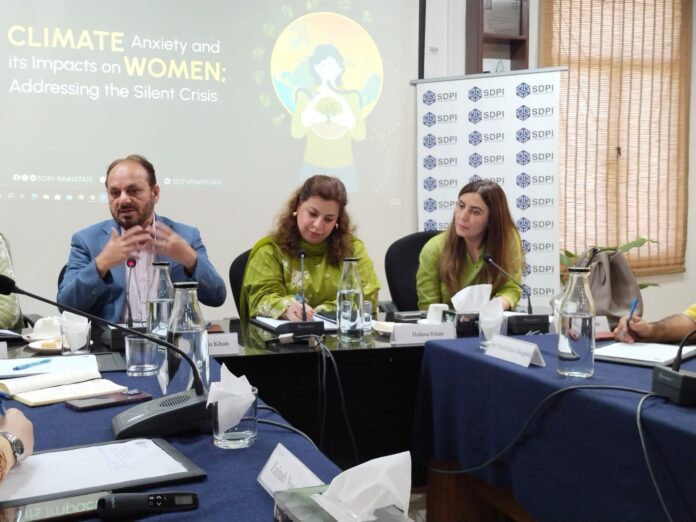By Hina Kiyani
ISLAMABAD: The Speakers at a seminar on the psychological impacts of climate change on women underscored that women received four times more impacts of a heatwave than males increased climate anxiety among women, a serious issue affecting their health post disasters, and needs attention of the policymakers.
The Sustainable Development Policy Institute (SDPI) organised a seminar titled “Climate Anxiety and its Impact on Women: Addressing the Silent Crisis” that provided an open platform for women hailing from different fields and backgrounds to share their insights on the study done on climate anxiety prevalence in Pakistan.
Dr Shafqat Munir, Deputy Executive Director, SDPI said that climate anxiety in the context of women showed that she faced anxiety twice once during her suffering and the other if her family member was impacted by any disaster. In urban areas, women are facing climate anxiety but in rural areas and others where women have no voice, no idea of climate anxiety that needs to be probed and further studied to bring tangible outcomes for enhancing women’s resilience, he added.
Dr Shafqat mentioned that the study would serve as a baseline data for further rollout of the research in the rural areas. Zainab Naeem, Associate Research Fellow SDPI while presenting the key study findings said that the country in 2020 realized that the region was facing the highest temperatures as compared to the preceding years. However, recent projections indicate that the rising temperature might cross human bearable thresholds in the long run. “Climate Change has increased heatwave and floods’ intensity with extreme prevalence of anxiety disorders that directly linked mental disorders to climate change. In 2019, mental disorders affected 301 million people around the globe,” she said. Women, youngsters, and children from impoverished communities were more prone to bear the impacts of climate disasters, whereas people with mental illness were three times more prone to risk of death than people without mental illness, she added.
“One percent increase in suicides with an approximate one-degree increase in temperature above local ambient threshold revealed that hotter cities were more violent than cooler cities,” Zainab said.
Zainab Naeem said that the objective of the study was to assess the linkage of climate change with mental health of the masses and for that an online survey was done that received 500 responses. However, the respondents hailed from different occupations comprising 65% females and 35% males from age cohorts expanding from 18 to 60 years.
“38.3% of the respondents claimed that heat almost directly impacted them, whereas 43.3% got psychological symptoms post extreme climate events. 91.5% of them read or watch climate news regularly,” she said.
Humaira Jahanzeb, Team Lead at the Living Indus Initiative said the study shared useful findings and recommendations that should be shared with the policymakers, relevant ministries, and departments for effective interventions.
“We cannot ignore the impacts of climate change on people whether they are in rural or urban centers. Food insecurity, employment opportunities, and health crisis in the aftermath of climate change are interlinked and demand stakeholder engagement,” she added.
Zofeen Ebrahim, Environmentalist and Journalist said that Karachi has over 60% population living in an informal setup and women there are uneducated with poor access to the internet and have much stress in their lives.
Halima Khan, Head of Corporate Affairs, Energy Update said there was a need for awareness and education on mental health impacts of climate change which needs to be shared with the government authorities for proper policymaking.
Aftab Alam Khan, an international development consultant said interaction with women from different strata of society indicates challenges and problems faced by them amid the climate crisis whereas role of individuals at different levels in society was imperative to educate women on the health impacts of climate change.
Climate Change is exacerbating other issues related to women during disasters whereas it was necessary to engage women from the most impacted regions in research and solution-finding endeavors.
Sidra Riaz, Lecturer at NUML said the methodology of the study can be improved on the South Asian context as most of the evidence on subject matter was from the global north and no information existed from South Asia.
Sher Shah Khan Bangash, Climate Activist said women in leadership roles for climate forums and policy-making reduces climate anxiety, and gender justice was important to be focused as underscored in the study.
“We need to work on training more women as climate advocates to better collect effective evidence and data on ground from vulnerable and impacted population cohorts,” he added.
Jeya Jaggi, Rights Activists said lack of data on gender pertaining to climate catastrophes in the region was bottleneck towards effective policy actions a most of the evidence was developed by non-native entities and individuals.
She added that inclusion of rural voices in the study was important as many climate catastrophes had lost their cultural identities which was a serious issue.





